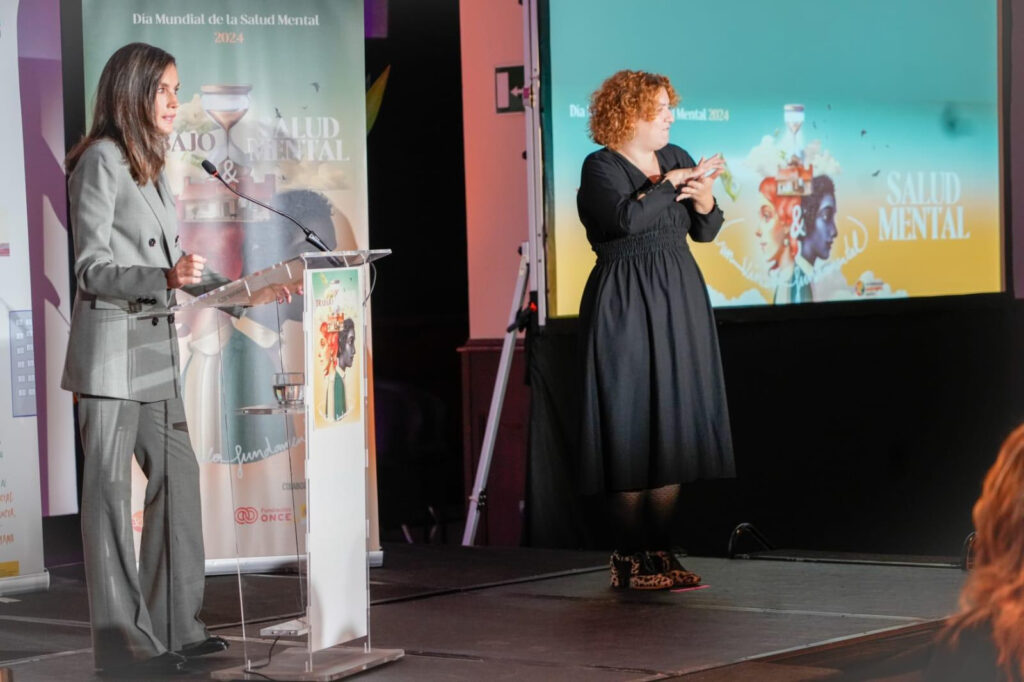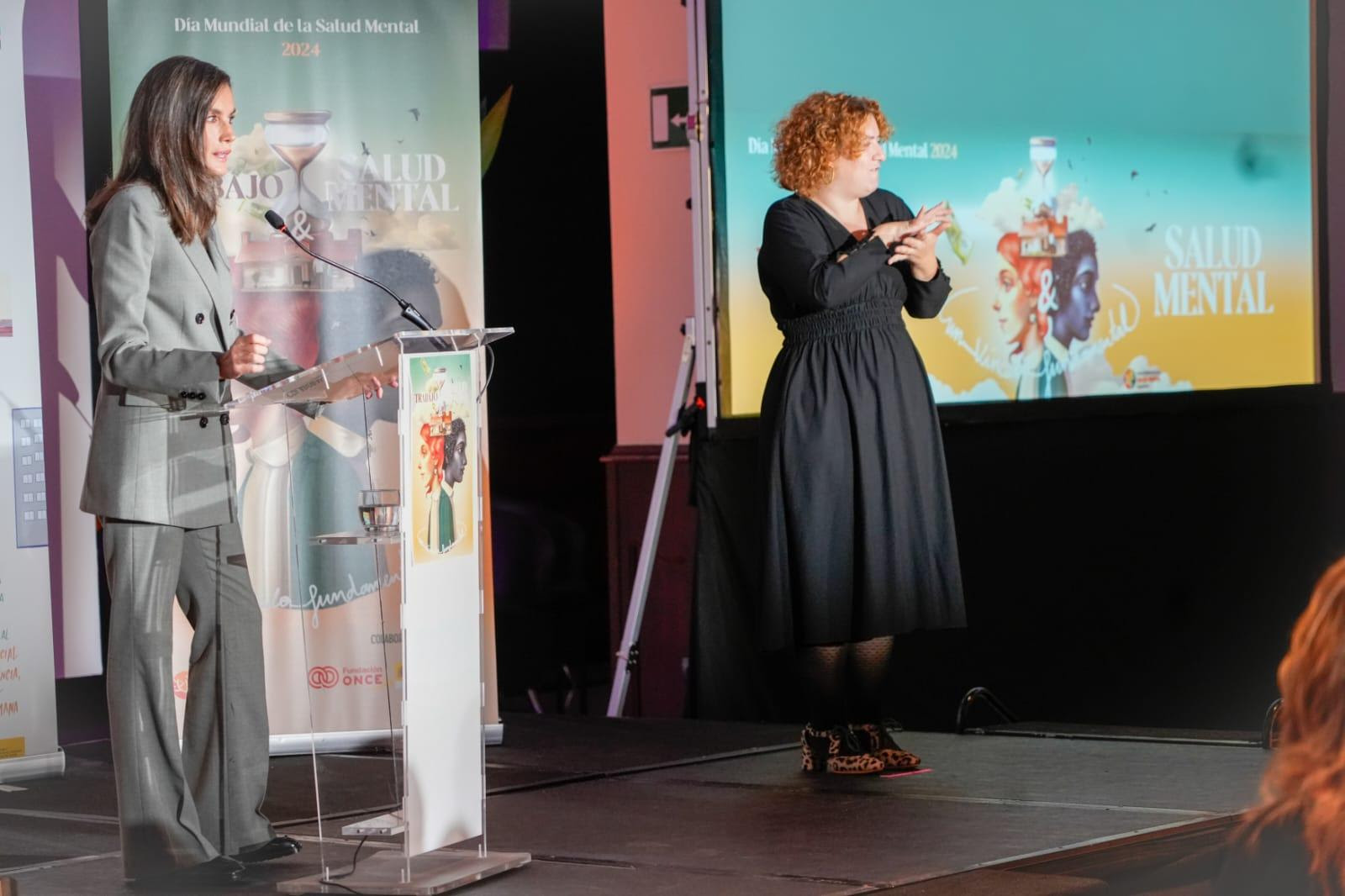

A hundred people gathered at the Institutional Event for World Mental Health Day, organized by the SALUD MENTAL ESPAÑA Confederation and financed by the Ministry of Social Rights, Consumption and Agenda 2030 and the ONCE Foundation. Its objective has been to address the importance of taking care of the mental health of workers in the work environment. Her Majesty the Queen opened the day by assuring that “when we talk about mental health, we often make a certain simplification and stick to the quickest message of taking care of mental well-being and considering a challenge that calls us all together: discomfort. psychic and the pathologies that derive from it.

In this framework, he recalled data from a recent report from the Ministry of Labor, which warns that “the impact on the mental health of precarious workers is much greater than that of less precarious workers.” His Majesty concluded his speech by highlighting the promotion of the professional figure of mutual support agents: “It is interesting – he acknowledged – because they are people who have already had their own experience in mental health and who accompany those who are in that process, “from respect, listening without judgment and horizontality, and therefore convey a message that is key in recovery.”
For his part, Nel González, president of the SPAIN MENTAL HEALTH Confederation, has stated that Excessive workloads, long hours, job insecurity or inadequate remuneration are some of the risks to mental health in the work environment.. He also recalled that only 13 out of every 100 people with a mental health diagnosis share their situation with their coworkers, according to the Report ‘The situation of mental health in Spain’.
“The business fabric can contribute to generating safe, healthy and inclusive work spaces. Raising awareness and informing about mental health care, so that it is not a taboo or something to hide, and training people so that they can address situations related to this, is one of the first steps,” said the president of SALUD. MENTAL SPAIN. He added that “it is the Administrations and public powers that must arbitrate the necessary legal measures to protect the health of workers in the workplace, including the detection, prevention and addressing of psychosocial risks.”

During her speech, Sira Rego, Minister of Youth and Children, in her speech, pointed out mental health as “one of the most important challenges of our time“, recognizing that “we must be able to resolve some structural causes linked to inequality and that challenge us collectively as a society.” “We cannot solve this problem by medicalizing inequalities and focusing on the issue only from a pharmacological point of view,” he stated and appealed for a paradigm shift, “to remember the importance of human ties, solidarity and the creation of collective projects.” ».
Make mental health visible
Prior to the interventions, to start the event, a he video ‘Mental health plus occupational health: global benefit’, prepared by the Confederation within the ‘Work without masks’ campaign. Employ without barriers’with the support of the Ministry of Social Rights, Consumption and Agenda 2030. In it, five people from the associative movement of SALUD MENTAL ESPAÑA gave their testimony about their experiences in work environments, describing various situations of discrimination. The people participating in the video were Elisabet Lemos, from AFES Mental Health; Inmaculada Carrasco, from the Ceuta Mental Health Association; Francisco Javier Moreno, from the Andalusian Mental Health Federation; Juan Gabriel Quintana, from the El Cribo Mental Health Association, and Ana María Martínez, from FAEMA Mental Health Ávila.
Next, the representation of one of the scenes from the play Click!, with the help of La Rueda Teatro Social, which served to make visible and put on the table situations of discrimination that people with mental health problems can regularly experience in their work environment. The theatrical piece aims to raise awareness about how the environment (both the company and the staff that comprise it) can positively or negatively influence the inclusion of the person who has a mental health problem and even their recovery process. , and how stigma very significantly affects their well-being.
First person experiences
To end the day, a debate took place between the journalist and winner of a Pulitzer Prize Sea Goatand the doctor and writer Eduardo Varaauthor of the book ‘Damn Job’. Both spoke about the link between mental health in the field of employment, debated the psychological suffering of workers and the stigma of mental health in work environments, and talked about job insecurity and its impact on well-being.
Mar Cabra explained how she came to develop the syndrome burnout (of the burned worker), after working on his investigation into the Panama Papers, “although at that moment I didn’t know how to put words to what was happening to me, and neither did my bosses.” For Cabra “we have a global labor market that is broken, because we are organizing ourselves productively poorly. “We have unmanageable workloads in most professions.”
To conclude, the journalist highlighted the responsibility of companies in the emotional well-being of their workers, appealing, among other issues, to digital disconnection and healthy digitalization, and remembering that “stopping is productive.”
For its part, Eduardo Vara, He pointed out two factors that he considers crucial in the mental health of working people. The first is found in a “mismatch of expectations.” On the one hand, companies that have the expectation of finding hyper-prepared workers, with an almost religious mentality, putting work before other things, and, on the other hand, hard-working people who are looking for flexibility, conciliation, to feel useful, not only at work, but with their families and social networks.
The second factor pointed out by Vara was cynicism in organizations, “against which we have to fight.” «Sometimes certain dynamics occur, in which, from some sectors, there is a certain posture about people’s concern and mental health, when really what is transmitted is that the problems are being ignored… that fosters a climate of distrust. , opening the door to cynicism, which has also been seen to affect both the people who suffer from it and the people who practice it, and which seriously damages productivity.
Claims of MENTAL HEALTH SPAIN
On the occasion of World Mental Health Day, the Confederation makes a series of demands in the workplace, which are the following:
- Involvement of companies in generating safe, healthy and inclusive environmentswhere mental health is cared for and talked about, without taboos or prejudices. Promotion, by the public administration, of measures against job insecurity and the control of occupational and psychosocial risks in companies.
- Implementation in companies a system of supports and adaptations just as workplaces are adapted for other disabilities, also respecting the privacy of the person.
- Resources that facilitate job placement of people with mental disorders, such as job trainingthe job placement in ordinary employment positionsthe promotion supported employment and the Special Employment Centers.
- Compliance with the job reservation quotas for people with disabilities (currently 10%), both in the public Administration and in the private sector, and that the quota reserved for people with mental disorders is at least 2%.
- Incorporation of the methodology of peer support.
